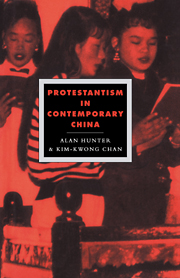Book contents
- Frontmatter
- Contents
- List of figure and tables
- General editors's preface
- Acknowledgements and notes on the text
- List of abbreviations
- Map
- Introduction
- 1 The social and political context
- 2 A survey of the Protestant community
- 3 The historical legacy
- 4 Protestantism and Chinese religious culture
- 5 Varieties of Christian life
- 6 Buddhism and Catholicism
- 7 Into the 1990s
- Bibliography
- Index
3 - The historical legacy
Published online by Cambridge University Press: 04 May 2010
- Frontmatter
- Contents
- List of figure and tables
- General editors's preface
- Acknowledgements and notes on the text
- List of abbreviations
- Map
- Introduction
- 1 The social and political context
- 2 A survey of the Protestant community
- 3 The historical legacy
- 4 Protestantism and Chinese religious culture
- 5 Varieties of Christian life
- 6 Buddhism and Catholicism
- 7 Into the 1990s
- Bibliography
- Index
Summary
PROTESTANTS, POLITICS AND THE CHINESE COMMUNIST PARTY
From 1911 to 1927, the provinces of China fell under the domination of various warlords, the central government was ineffective and there was no national religious policy. Even when the nationalists consolidated their control, the ruling GMD itself held an ambiguous attitude towards religion. On the one hand it regarded religious freedom as an expression of modernism and democracy, which it espoused in theory at least. Thus in the GMD First National Congress in 1924 a resolution was adopted offering ‘absolute freedom of association, of speech, of publication, of domicile and belief’. Again in 1931 a draft for a provisional constitution stated ‘There shall be freedom of religious belief’ and in 1935 the new criminal code gave protection to all kinds of religious services.
However there was also a strong tendency towards authoritarianism in the GMD, and many of its officials regarded religion as superstitious, an expression of backwardness, or as a potential source of rebellion. In the case of Christianity, the conceptual critique was largely borrowed from mid-nineteenth-century European materialists such as Haeckel. A more graphic illustration was provided by an immense poster on the gate of the Jiangsu GMD headquarters which stated: ‘Jesus Christ is an obstacle to human progress and an evil spirit incompatible with the spirit of this generation.’
- Type
- Chapter
- Information
- Protestantism in Contemporary China , pp. 105 - 140Publisher: Cambridge University PressPrint publication year: 1993



